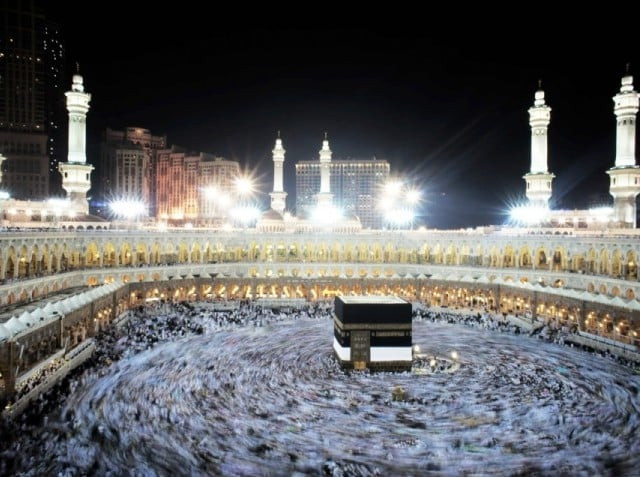World's Muslims speak with signs, gestures in Makkah
Nods, smiles, frowns, and hand gestures speak volumes in Makkah where Muslims gathered for Hajj.

In the Grand Mosque, home to the holy Kaaba, an African woman frowns and waves her hand to signal to a female Turkish pilgrim that the prayer is not yet over.
She understands, nods, smiles and continues to pray. Afterwards they shake hands and exchange smiles.
It all takes place in silence, both women well aware that they could not have had this dialogue aloud as they speak very different languages.
"We call this special means of communication the 'language of the Haram' (Grand Mosque)," says Ali Abdullah, a Sudanese shopkeeper living in Makkah.
"I deal with Asian pilgrims using sign language," he said. "We depend on body language and signs and even on drawings in some cases.
"I can deal better with Nigerians and other Africans who can usually speak English, but Asians have their own languages which I can't understand."
Abdullah, who has been working in Makkah for five years, tries to improve his communication skills by offering customers a pen and paper to draw the item they are looking for as he tries to commit to memory the words they use for the drawing.
"I try to memorise it in case someone asks for the same thing in future," he says with a grin.
Meanwhile his colleague Rasheed Ali, from Myanmar, proudly announces "I speak 10 languages. I learned them all from working here for 17 years."
Pilgrims nearby stop to ask a security official for directions. He understands, nods and points.
"I don't speak foreign languages but I can understand what they are trying to say and they usually understand my directions," he says. If not, he has to leave his post and lead them to their destination.
It took Majed al-Qulaisi, a Saudi merchant, two to three years to learn Turkish, Malaysian and some Russian. But with Africans, he still communicates using sign language.
"Sometimes they don't understand what I'm saying. I could say something which a pilgrim would interpret as an insult, get cross with me and walk out of the shop."
After 11 years in the small shop selling rosaries made from precious stones, Qulaisi's job has become easier as he now knows beforehand what stones every pilgrim is looking for depending on their country of origin.
"Southeast Asians usually look for pearls, coral, and wooden rosaries," he said. "Africans prefer long rosaries while Turks look for smaller ones with 33 beads" instead of the standard 99, representing the various names of God.
A few kilometres away, a policeman trying to organise the pilgrims' movements in and out of the mosque waves his arms to direct the crowds, whose various phonetics mingle to form a loud reverberating buzz inside the building.
But silence descends as prayer begins and the pilgrims all recite the holy Muslim book the Quran, and worship Allah (God) in Arabic.
Speaking English with difficulty, a Turkish pilgrim says "in the mosque we understand with signs."
Signposts in the mosque and its squares are often illustrated with drawings in addition to being written mainly in English, Arabic and Urdu.
The Saudi authorities have taken various small steps to try to overcome the linguistic challenges posed by the pilgrimage of more than two million foreigners who arrive each year for the world's largest Muslim gathering.
As pilgrims pour into the country through the hajj terminal in Jeddah airport, they are met by officials from the ministry of hajj, many of whom are capable of giving directions and advice in different languages.
Millions of booklets, films, copies of the Quran and tapes in various languages are also handed out to pilgrims arriving from abroad. Media outlets provide basic information in 32 different languages.
A hotline, the Mnask service, has also been set up to respond to the questions of pilgrims in Arabic, English, French, Urdu, Indonesian, Turkish, Bengali and Hausa.
The authorities have launched a free smart phone application that provides a simple explanation on hajj rituals in four languages – English, Arabic, Indonesian, and Urdu.
The religious police have meanwhile hired 700 translators to guide pilgrims in Makkah and the second holy city Madinah.
Some pilgrims attempt to learn some Arabic during their short stay for hajj.
"I have learned a few Arabic words to help me communicate with people here. I can say 'shukran' which means thank you and 'sabr' which means patience," said a US pilgrim of Nigerian origin.
"In the United States we say restrooms, but here they understand toilets, so I do my best to use the words I figure they can understand."
By contrast, however, a young Chinese woman standing nearby shakes her head and stares blankly when approached, saying "China" and an Iranian pilgrim gives a similar reaction repeating "Farsi, Farsi."



















COMMENTS
Comments are moderated and generally will be posted if they are on-topic and not abusive.
For more information, please see our Comments FAQ